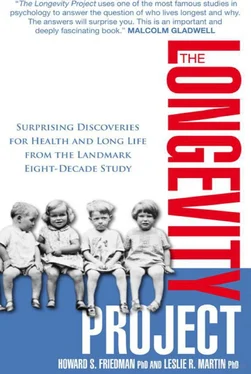The Persistent, Consequential, and Social Life
The 1,528 Terman participants were all quite intelligent, with a good start in life. By age ten they were doing well in school, were noticed by their teachers, and were being investigated by a Stanford professor—Lewis Terman. Many went on to be successful, but quite a large number of their fellow participants faced regular disappointments—in love, in careers, and in length of life. Some who succeeded were lucky, but many others made their own luck.
Across the life span, many predictors emerged as to who would do better and who would do worse, who would live longer and who would die younger. It was not good cheer or being popular and outgoing that made the difference. It was also not those who took life easy, played it safe, or avoided stress who lived the longest. Rather, it was those who—through an often-complex pattern of persistence, prudence, hard work, and close involvement with friends and communities—headed down meaningful, interesting life paths and, as we have illustrated, found their way back to these healthy paths each time they were pushed off the road.
The qualities and lifestyles cultivated by people on these long-life paths reflect an active pursuit of goals, a deep satisfaction with life, and a strong sense of accomplishment. That’s not to say that these people possessed a giddy sense of happiness—we described how cheerfulness doesn’t necessarily lead to a long life. But having a large social network, engaging in physical activities that naturally draw you in, giving back to your community, enjoying and thriving in your career, and nurturing a healthy marriage or close friendships can do more than add many years to your life. Together, they represent the living with purpose that comes from working hard, reaching out to others, and bouncing back from difficult times.
How fascinating to understand that those individuals who became involved with others in a consequential life would be improving their health as an unanticipated bonus. Of course many consequential lives have been cut tragically short, and some long lives seem bereft of accomplishment. Still, because getting and staying on healthy life paths can be a lifelong challenge, it is heartening to know that embracing the lessons of the Terman participants and striving for a socially richer and more productive life will increase the odds of a long life as well.
EPILOGUE
Long Life and Public Health
Looking Ahead to What Society Should Do
Our research findings point to the startling conclusion that many of the most cherished recommendations and policies about health are misguided. This eight-decade study of the successful paths to health and long life suggests that traditional approaches to health care and health promotion have some disquieting deficiencies.
Health care costs are exploding while overall quality of health is static. Many scientists predict that, for the first time, expected longevity will begin decreasing. They point to the failure of individuals to follow medical advice to exercise, lose weight, sleep enough, wear sunscreen, take it easy, eat right, be properly scanned, avoid illegal drugs, and take enough prescribed pills on the proper schedules. We, however, are more optimistic. After spending two decades studying the lives of the Terman participants, we see ways to turn things around.
Our findings about long life are now being tested, bit by bit, by other researchers using different people—those born in later years, in different subcultures, and in diverse populations. Yet the pathways to long life seem very much the same. The most recent evidence suggests that the core findings from the Terman studies are very relevant to health today.
Lewis Terman died in 1956, just before his eightieth birthday. This was quite a long life for someone of his generation, especially for someone who had spent much of his early life suffering from recurring tuberculosis (which eventually hastened his demise). Probably not coincidentally, his wife had died earlier that same year, after more than fifty years of marriage. To the very end, he immensely enjoyed his contact with his subjects and remained in touch with almost all of them. A conscientious, active, and hardworking man who faced many stresses, Dr. Terman had set out to study the characteristics and successes of talented individuals, but he came to recognize that talent was much more complicated than he had imagined. The same might now be said about our understanding of the bases of health and longevity.
Policy makers and laypersons alike tend to make two major conceptual errors when thinking about health and longevity. First, people tend to overestimate the importance of family biology. Your height is heavily influenced by the genes you inherit from your parents, and your eye color is determined, but predicting your own health and longevity from that of your parents is mediocre at best. Sure, tendencies toward certain diseases run in families, and some diseases have clear genetic causes. This knowledge is helpful in choosing screening tests and having an idea which warning signs to watch for. But as a predictor of whether you will have a heart attack or live a long life? The experience of your relatives is not very precise at all. Your own life path matters more.
The second core error about health, which we’ve described in our research above, is the idea that we can make a major difference in health and longevity by giving people lists of health recommendations. We often hear physicians say, “Of course eat right, stop smoking, lose weight, sleep more, exercise, etc., etc., etc., should be the first choice in staying healthy but most of my patients can’t do this, so it is a great thing that we have these effective medications.” Such sentiments are perfectly natural, because if you hand most patients a list of life-altering changes, they will not make them.
The Terman participants who led long lives were never handed such a list. Yet they found their ways to healthy pathways. When a society’s approach to health is dominated by threats and diseases, it pushes us to focus on things going wrong inside the individual’s body—that is, on the infections, blockages, genetic aberrations, and hormonal and chemical imbalances. Our doctors then try to repair the problem. As we have repeatedly noted, for an acutely ill person, or for someone in deteriorating health, this approach can often work wonders—therein are the miracles of modern medicine. However, this approach is only part of the story, and the roads to long life are ignored at our peril.
Using data derived from the more than eighty years of the Terman study, and collecting and creating new information about the participants’ lives, health, longevity, and causes of death, we have discovered many things we did not expect. We came to see the sometimes-complex but nonrandom pathways that link personalities, predispositions, behaviors, social groups, work environments, and health and longevity.
In contrast to finding a penicillin for infection or a clot-buster for stroke, simple “cures” for unconscientious personalities, marital instability, exposure to traumatizing stress, social isolation, workplace failures, and social-psychological anomie and estrangement are unlikely to be found in the clinic. Indeed, because individuals and their social groups change over time, the challenges likewise evolve.
Why Lists Don’t Work So Well
When John Kennedy became president he immediately began emphasizing the importance of physical health and the role of government in promoting fitness. Fifty-mile hikes became a fad. This was the same year that Terman participant Dr. Ancel Keys, featured on the cover of Time magazine, told Americans that they ate too much. Now, half a century later, most segments of the American population are not only more obese but are less fit than ever. This doesn’t mean that President Kennedy’s efforts were misguided or caused today’s problems. But it does suggest that such traditional approaches are often ineffective over the long term.
Читать дальше











